Considered
 163
163
of Research
 31
31
Examined
 9
9
Interviewed
From my own experience in the gym, I can attest to how demanding weight training can be. Juggling reps, sets, and weights and then adding fitness tracking on top? It can be overwhelming.
I've had days when it felt like it was too much, but the right tracker made all the difference.
I've lifted weights for decades now, and I've had a fair share of fitness trackers. Many just didn't cut it for me mostly because they lacked features or didn't provide the value I was looking for.
But after working with Total Shape’s team to test a variety of fitness trackers, we were able to see how our clients, who spend a lot of time on weights, would benefit from the best models on the market.
The Best Fitness Trackers for Weightlifting
- Best Overall Fitness Tracker for Weightlifting: Garmin Forerunner 935
- Cheapest Fitness Tracker for Weightlifting: Samsung Gear Fit2 Pro
- Best Fitness Tracker for Beginner Weightlifters: Fitbit Inspire HR Fitness Tracker
- Best Android Smartwatch for Weight Training: Fitbit Versa 2
- Best Weightlifting Smartwatch for iPhone: Apple Watch Series 8
- Best Weightlifting Fitness Tracker for Small Wrists: Fitbit Inspire HR Fitness Tracker
Our Top Fitness Tracker For Weightlifting (January 2026)
1 - Garmin Forerunner 935 (Best Overall)

- Dimensions : 0.5" x 1.8" x 2.1"
- Maintenance : Easy
- Design : Comfortable, lightweight
- Warranty : Yes (1 year)
- Premium materials : Yes (Fiber-reinforced polymer)
Pros and Cons
Pros
- Weighs less than 50 grams so you should barely notice it
- Provides training feedback to help you get the intensity right
- Optional chest strap may provide more accurate HR data
Cons
- Some of the features require multiple menus to see the data
Who is it for?
Who is it for?
- Serious weightlifters
- Fitness enthusiasts
Who is it not for?
- Budget-conscious buyers
Final Verdict
Excellent for tracking and training feedback, although navigating menus can be tricky at first.
We like this fitness tracker from Garmin because it could be one of the lightest watch style ones we found, making it a comfortable and practical choice.
It also has smart features like HR tracking on your wrist, or with an optional strap for the chest for more accuracy.
I've had a positive experience with this device, as it provides information about my speed, duration, and heart rate during workouts.
Total Shape’s team has also recommended it for those serious about tracking workouts and performance metrics.
Nevertheless, the device has been around for a while, and its prices haven't seen substantial declines over time. Although I was fortunate to purchase it on sale, finding a three-digit price reduction in most stores remains challenging.
The only negative is navigating through the menus which I found tricky at times in my own experience. It took time before I got used to it.
2 - Fitbit Versa 2 Health and Fitness Smartwatch (Best for Android Users)
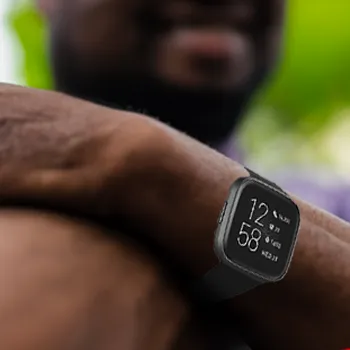
- Dimensions : 1.56" x 1.59" x 0.47"
- Maintenance : Easy
- Design : Sleek
- Warranty : Yes (1 year)
- Premium materials : Yes (Aluminum case)
Pros and Cons
Pros
- May help you analyze your rest and recovery period
- Fitbit app may help with setting and tracking your goals
- Store all your activity in one place
Cons
- GPS tracking is only available through a smartphone
Who is it for?
Who is it for?
- Android users
- Goal-oriented athletes
Who is it not for?
- Users needing standalone GPS
Final Verdict
Great for tracking goals and workouts, but relies on a smartphone for GPS tracking.
If you’ve used a Fitbit fitness tracker and want to move a step up to a smartwatch, then the Versa 2 could be a fantastic and worthwhile choice.
Many athletes like the mobile app that comes with it as you could use it to set and track your overall goals.
According to Total Shape's team, this device offers a range of features that help me stay motivated and achieve my fitness goals.
The built-in workout modes and tailored coaching features allowed me to remain motivated and push myself harder at the gym.
I remember going for a jog thinking it was tracking my distance all along only to my surprise it was not. I later realized it needed my smartphone's GPS to do that.
3 - Apple Watch Series 8 (Best for Iphone Users)
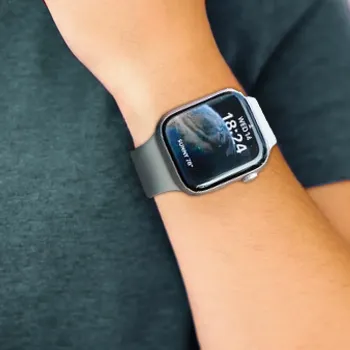
- Dimensions : 1.73" x 1.5" x 0.41"
- Maintenance : Easy
- Design : Premium
- Warranty : Yes (1 year)
- Premium materials : Yes (Aluminum or stainless steel)
Pros and Cons
Pros
- Highly functional
- Impressive sleep tracking capabilities
- Comes with different styles and color options
Cons
- Not the best budget option
Who is it for?
Who is it for?
- iPhone users
- Health-conscious individuals
Who is it not for?
- Budget-conscious buyers
Final Verdict
Highly functional with extensive features, though it comes at a higher price point.
The Apple Watch Series 8, introduced in September 2022, features minimal changes from its previous generation, with the addition of notable temperature sensors, including one beneath the screen.
This watch is entirely water resistant, making it excellent for steamy weightlifting gyms with inadequate air conditioning and ventilation.
Using the Medications app on this device, I effortlessly ensured I never missed my vitamins and supplements. This is just scratching the surface – users will uncover plenty of tools, including the capability to quickly craft personalized exercise routines and track heart rate zones.
However, one of the downsides of this watch is it tends to be on the pricier side, making it not accessible for the majority of people.
4 - Fitbit Inspire HR Fitness Tracker (Best for Beginners)
- Dimensions : 1.2" x 0.63" x 0.46"
- Maintenance : Easy
- Design : Slim
- Warranty : Yes (1 year)
- Premium materials : Yes (Plastic case)
Pros and Cons
Pros
- The design makes it small and lightweight to avoid getting in your way
- One of the cheaper options with HR monitoring
- Simple rest data may help you plan better recovery periods
Cons
- Some hand movements may trigger activity tracking
Who is it for?
Who is it for?
- Beginners
- Users with small wrists
Who is it not for?
- Users needing detailed display
Final Verdict
Compact and affordable, ideal for beginners, but hand movements might trigger activity tracking.
Another excellent and reliable option with real time heart rate monitoring is the Fitbit Inspire. A lot of people claim that it has precise measures despite being so small and reasonably priced.
The size is also probably why bodybuilders with small wrists like it for lifting heavy stuff during strength training. Fitbit is one of the best fitness trackers band in the market, as users rave about their sport watches.
In its menu section, I found a search feature like Google's search engine, offering multiple pre-saved foods for convenient access input when tracking your dietary intake.
I had a funny moment with my wife a few weeks ago when I was assisting her in baking and noticed my Fitbit counting steps. Turns out some of my hand movements when kneading the dough were registered as steps.
5 - Garmin vívomove HR

- Dimensions : 1.69" x 1.69" x 0.46"
- Maintenance : Easy
- Design : Stylish
- Warranty : Yes (1 year)
- Premium materials : Yes (Stainless steel)
Pros and Cons
Pros
- May help track your aerobic performance by tracking V02 max
- Claims to have a detailed sleep tracking to stay on top of your rest phase
- Seems to be easy to select different data during weight training
Cons
- Only provides an estimated heart rate
Who is it for?
Who is it for?
- Bodybuilders
- Users wanting detailed V02 info
Who is it not for?
- Users needing precise HR
Final Verdict
Provides useful aerobic performance data and easy data selection, but HR is only estimated.
Another one from Garmin on our best fitness trackers list for weight lifting, proving their consistent quality. This Garmin fitness tracker claims to give you good V02 max info, which could be helpful for bodybuilding sets.
We also liked that it seems to be easy to get the info you need with a simple touch of the screen.
Just keep in mind that it’s estimated heart rate tracking you get, which may not be precise enough.
6 - Fitbit Charge 3 Fitness Activity Tracker
- Dimensions : 1.5" x 0.89" x 0.45"
- Maintenance : Easy
- Design : Durable
- Warranty : Yes (1 year)
- Premium materials : Yes (Aluminum case)
Pros and Cons
Pros
- Claims to have constant and accurate HR monitoring to get details about resting rate
- Suitable for many different sports, including swimming
- Comes with different size bands for larger wrists
Cons
- Limited information available on the display
Who is it for?
Who is it for?
- Multi-sport athletes
- Swimmers
Who is it not for?
- Users needing real-time info
Final Verdict
Accurate HR monitoring and good for various sports, though limited display information.
This fitness tracker industry is popular in many types of sports even with swimmers because it seems to have a good database of activities.
And the different strap sizes might be helpful if you have muscular forearms.
During my testing of Fitbit, I found their approach to presenting extensive data over several days particularly impressive. They've made it easy to comprehend by offering week-long charts and multiple daily views, all conveniently displayed on a single screen.
They also allow data to be exported in various formats, even to third-party applications, enabling minute-by-minute export of heart rate data, among other features.
We just found that the screen doesn’t show enough info in real-time.
7 - TicWatch Pro 4G LTE Cellular Smartwatch

- Dimensions : 1.77" x 1.77" x 0.45"
- Maintenance : Easy
- Design : Rugged
- Warranty : Yes (2 years)
- Premium materials : Yes (Stainless steel)
Pros and Cons
Pros
- Claims to use smart sleep tracking to better assess your rest time
- Military-grade durability should protect from knocks at a weight rack
- Water resistant design also makes it suitable for swimming
Cons
- It’s not one of the smallest fitness watches
Who is it for?
Who is it for?
- Heavy-duty users
- Swimmers
Who is it not for?
- Users preferring smaller watches
Final Verdict
Durable and water-resistant with smart features, but slightly large for some users.
What’s cool about the TicWatch is that it doesn’t rely on your phone to receive messages.
But the reason we put it on the list is that it claims to have military-grade toughness. You’ll know why that’s important if you’ve ever hit your watch off a barbell.
Despite being slightly thicker than most competitors, I felt that this watch maintains a surprising level of lightness and comfort when worn. It served as an alternative to my phone, particularly during workouts.
I effortlessly connected it via Verizon Number Share, enabling me to make and receive phone calls and exchange text messages, all without the need for my phone to be nearby or even powered on.
For some people, it might just be a bit on the large side.
8 - Scosche Rhythm+ Heart Rate Monitor Armband

- Dimensions : 1.5" x 0.5" x 0.5"
- Maintenance : Easy
- Design : Comfortable
- Warranty : Yes (1 year)
- Premium materials : Yes (Silicone band)
Pros and Cons
Pros
- The comfortable strap shouldn’t get in the way of your lifting
- Reviews highlight that it seems to provide accurate HR info
- Syncs with many popular fitness apps
Cons
- Might not be suitable for tracking HR all-day
Who is it for?
Who is it for?
- HR-focused users
- App users
Who is it not for?
- Users needing all-day wear
Final Verdict
Comfortable and accurate HR monitor, easy app sync, but not ideal for all-day wear.
If you just need a fitness tracker to measure your heart rate, then we would recommend this armband.
According to Total Shape’s team, this device is comfortable, precise, and seamlessly syncs with other devices and fitness apps. The heart monitor, in particular, delivers impressively accurate readings.
You might not want to be wearing it all day, though, as some find the band annoying after a while.
9 - Fitbit Blaze Smart Fitness Watch

- Dimensions : 1.6" x 1.6" x 0.44"
- Maintenance : Easy
- Design : Versatile
- Warranty : Yes (1 year)
- Premium materials : Yes (Stainless steel)
Pros and Cons
Pros
- Should work well for many different sports
- Fitbit app allows you to set certain goals for the week
- Continuous HR tracking should help you get to the right intensity
Cons
- The watch face is quite large
Who is it for?
Who is it for?
- Multi-sport users
- Goal-setters
Who is it not for?
- Users needing compact watches
Final Verdict
Versatile with goal-setting features, but large watch face may be inconvenient.
This is another watch that has a range of sport mode settings to cover different activities at the gym.
And the goal-setting in the app should allow you to keep on top of your daily routines.
After using the device for approximately three weeks, I've found that it accurately measures resting heart rate and heart rate during low activities. I've even taken manual pulse checks while at rest to compare with the reading from Fitbit, and they aligned perfectly.
As many reviewers have pointed out, during intense activities, it may be more inaccurate, which is common for optical HR monitors.
We did find it quite a bit larger than most other devices.
10 - Samsung Gear Fit2 Pro Smartwatch Fitness Band (Cheapest Option)

- Dimensions : 1.97" x 0.94" x 0.47"
- Maintenance : Easy
- Design : Compact
- Warranty : Yes (1 year)
- Premium materials : Yes (Plastic case)
Pros and Cons
Pros
- Small display with clear training information
- Comes with built-in GPS to map your runs
- Watch straps may be swapped out easily for larger wrists
Cons
- May require multiple apps for all features
Who is it for?
Who is it for?
- Budget-conscious users
- Runners
Who is it not for?
- Users avoiding multiple apps
Final Verdict
Affordable with clear training info and built-in GPS, but may need multiple apps for all features.
The final fitness tracker we put on our recommended list is this Samsung one.
The small display feature could be ideal, as it provides detailed training information that seems easy to read.
One standout feature I appreciated during my testing of this device was the Samsung Health app's capability to measure blood oxygen levels using the rear of the phone (the app provides guidance on finger placement for accuracy).
Additionally, the GPS functionality impressively tracks my workouts independently, eliminating the need for a connection to my phone.
We just found it a bit annoying that some exercises required switching between apps.
How We Picked These Products
In our journey to identify the top fitness trackers for weightlifting, our approach was both hands-on and data-driven. Reflecting on our experiences, here's how we meticulously selected the products:
Accuracy of Weightlifting Metrics
Our primary focus was on the precision of weightlifting metrics. We engaged in numerous gym sessions, rigorously testing each tracker's ability to monitor our workouts accurately. We paid special attention to how well these devices tracked heart rate, activity levels, and other key indicators during intense weightlifting routines.
Durability and Build Quality
Understanding the rough and tumble nature of weightlifting, we assessed the build quality of each tracker. We exposed them to the typical rigors of a gym environment, including accidental knocks against equipment, to ensure they could withstand the test of time and pressure.
Battery Life
We monitored the battery life of each tracker under regular use conditions. This involved tracking several days of continuous use, including during lengthy workout sessions, to ensure that the devices wouldn't fail mid-session.
Comfort and Fit
Recognizing the importance of comfort during workouts, we tested each tracker for its wearability. This included evaluating how they felt on the wrist during various exercises and whether they caused any distraction or discomfort while lifting weights.
Compatibility with Weightlifting Apps
We paired each tracker with multiple weightlifting apps to test compatibility. Our goal was to ensure seamless integration, allowing for easy tracking and analysis of workout data.
Water and Sweat Resistance
Given the intensity of weightlifting sessions, we evaluated how well each tracker resisted water and sweat. This was crucial to ensure that the devices could endure sweaty workouts without any functionality loss.
In summary, our selection process was thorough and grounded in real-world testing. We pushed each fitness tracker to its limits to ensure we recommend only the best for your weightlifting journey.
Buyer's Guide: Gym Wearable Key Considerations
1 - Range Of Activities Tracked
Fitness trackers have come a long way since the days when they just counted your steps.
There are some devices that should be able to track dozens of unique workouts, including things like yoga and pilates.
If you tend to do multiple sports, running, and workout classes, research published by Live Science recommends that you try getting a device like a CrossFit fitness watch that can track as many exercises as possible [1].
2 - Display And Strap Size

Some people like to have a fitness device with all the smart features possible.
While technology has made this possible, these products still tend to be a bit bigger.
We generally advise avoiding a larger device, as it could get in the way of strength and endurance training. Even when it's not through the tactile feeling of these devices, the sheer size could distract you from focusing on the rhythm of your exercises.
3 - Heart Rate Monitor
The good news is that wrist-based heart rate monitoring has become a lot more reliable.
“Another way to gauge your exercise intensity is to see how hard your heart is beating during physical activity. To use this method, you first have to figure out your maximum heart rate — the upper limit of what your cardiovascular system can handle during physical activity.”
- MayoClinic.org
According to the Mayo Clinic, most of the above fitness trackers should give you real-time information, which you could use to adjust what intensity and heart zone you target [2].
4 - GPS
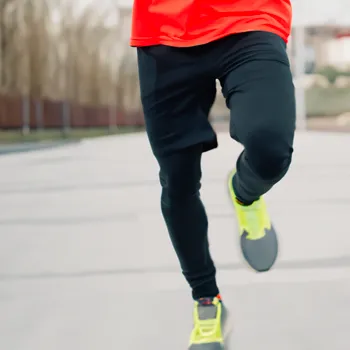
Fitness trackers with GPS started off as a pure gimmick as they were pretty unreliable.
However, if you do a lot of running or cycling, then modern technology could help you keep better track of your pace and distance.
You can check out our article on the best fitness trackers for cycling.
Related: Best Home Gym Clocks and Timers
5 - Fitness Tracker vs. Smartwatch
Many people use swatch watches and fitness trackers interchangeably, but there is a clear distinction between the two.
When choosing a device, it's important to understand that a fitness tracker only focuses on health while a smartwatch provides a variety of features including email, calendar management, and more.
While most smartwatches and all the best running watches contain fitness-tracking hardware, they are often more expensive than simple band-style fitness trackers.
Comprehensive Wear for Comprehensive Data
Many people use swatch watches and fitness trackers interchangeably, but there is a clear distinction between the two.
Most of the best smartwatches in the market and all the best running watches contain fitness tracking hardware. However, these devices are often more expensive than simple band-style fitness trackers.
When choosing a device, it's important to understand the differences between the two. A fitness tracker focuses on health while a smartwatch provides a variety of features including email, calendar management, and more.
FAQs
Do Fitness Trackers Work for Weightlifting?
No, fitness trackers don’t work for weightlifting in the sense that they would automatically record the amount and types of moves you make. But they may still work to tell you how intense your workout was, based on your heart rate.
Are Fitbits Good for Weightlifting?
Yes, most Fitbits are good for weightlifting, especially if they have a built-in HR monitor. The small size of the activity tracker is what many bodybuilders favor as it doesn’t tend to get in the way during workouts.
Our Verdict on Best Fitness Tracker for Weightlifting
In our quest to find the best fitness tracker for weightlifting, the Garmin Forerunner 935 emerged as the clear winner.
Drawing from the expertise of Total Shape’s team, which includes seasoned weightlifters and fitness enthusiasts, we put the Garmin Forerunner 935 through intense gym sessions.
Its lightweight design, accurate heart rate tracking, and valuable training feedback features were key highlights.
Despite the learning curve with its menus, the Forerunner 935 provided invaluable insights into our workouts, helping us optimize our training intensity.
Its blend of functionality and durability makes it our top recommendation for serious weightlifters seeking a reliable fitness companion.
With the right fitness tracker, your weightlifting progress can soar. At Total Shape, we provide the tools and advice you need to succeed. Check out our latest guides and become a part of the Total Shape community today.
Our #1 Recommendation
Garmin Forerunner 935 (Best Overall)

Rated With Total Shape's Scoring System
- Weighs less than 50 grams so you should barely notice it
- Provides training feedback to help you get the intensity right
- Optional chest strap may provide more accurate HR data
- Some of the features require multiple menus to see the data
About The Author
You May Also Like
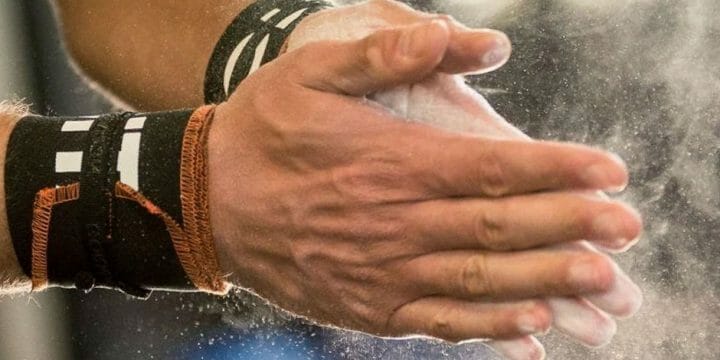



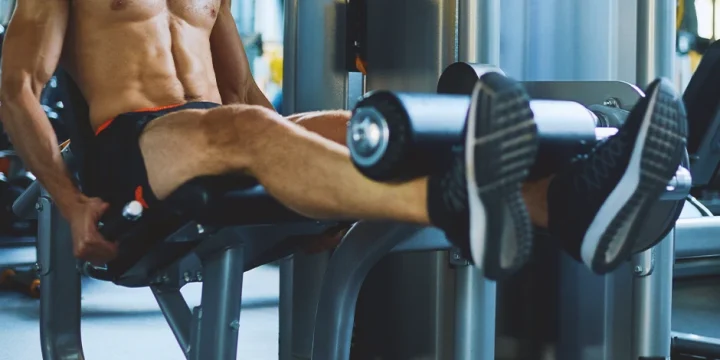
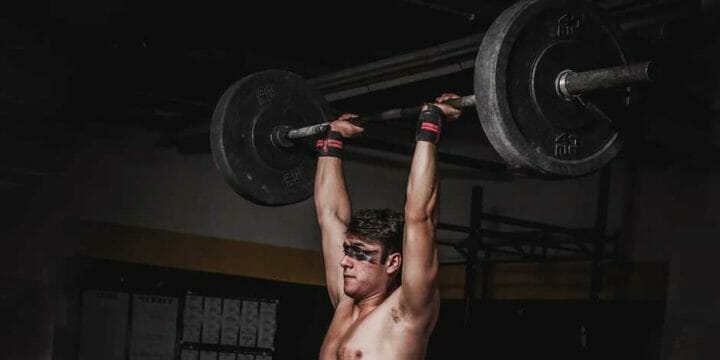
Imo the best fitness tracker for lifting weights is the Garmin Forerunner 935.
I’ve been a fan of fitness trackers for a while now and from my experience, Fitbit for weightlifting works best for me.